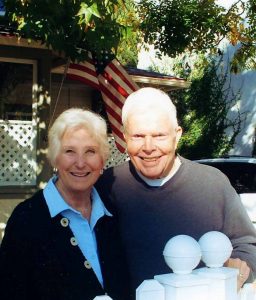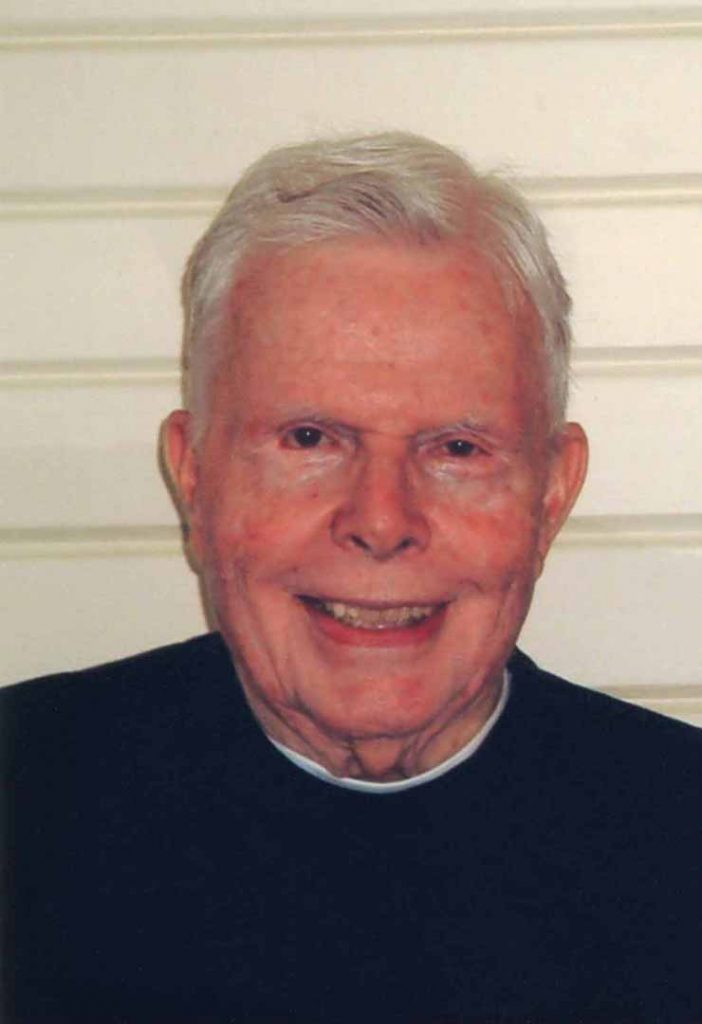
CARL JENNINGS, 1928-2020
Carl Jennings was descended from Southern gentlemen. He devoted his life to the Lord and affected the lives of thousands of Coronado residents over the years. He died January 11 of natural causes. His last wish was to die in his home. His family granted that wish and his last days were as he wanted them to be. Carl died a happy man. He was 91.
As a child during the Great Depression, Carl Jennings went door-to-door selling magazine subscriptions. Then, as a minister, he eventually had larger audiences but at times went door-to-door as he sold the word of God. Later in life, he found himself going door-to-door once again, this time selling insurance packages for Prudential Life Insurance. You see, Carl Jennings loved people, and they loved him.
In between, he served his country proudly in the Korean War and managed to have a family. Now, Carl serves with the Apostles and his Lord – something he has looked forward to for a very long time. The Apostles, you see, also went door-to-door.
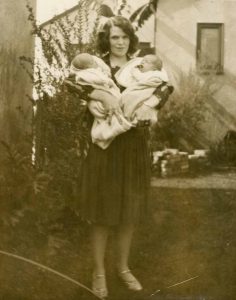
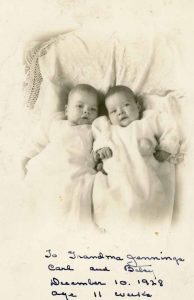
Carl Grattan Jennings, Jr. was born in Los Angeles, September 24, 1928. He had a twin sister, Betsy Ann Jennings, who predeceased him. Constant companions in their youth, Carl was an hour and a half older, and never let her forget that.
His parents were Carl Grattan Jennings Sr. and Elizabeth Baechtold. His father was in charge of the LA Schools Transportation System and owned his own trucking company. Later, towards the end of the Great Depression, he became an excavation contractor building such major projects as Lindbergh Field and Friant Dam. He also worked on Cajon Pass in San Bernardino, for the Santa Fe and Union Pacific Railroad, finally retiring in real estate.
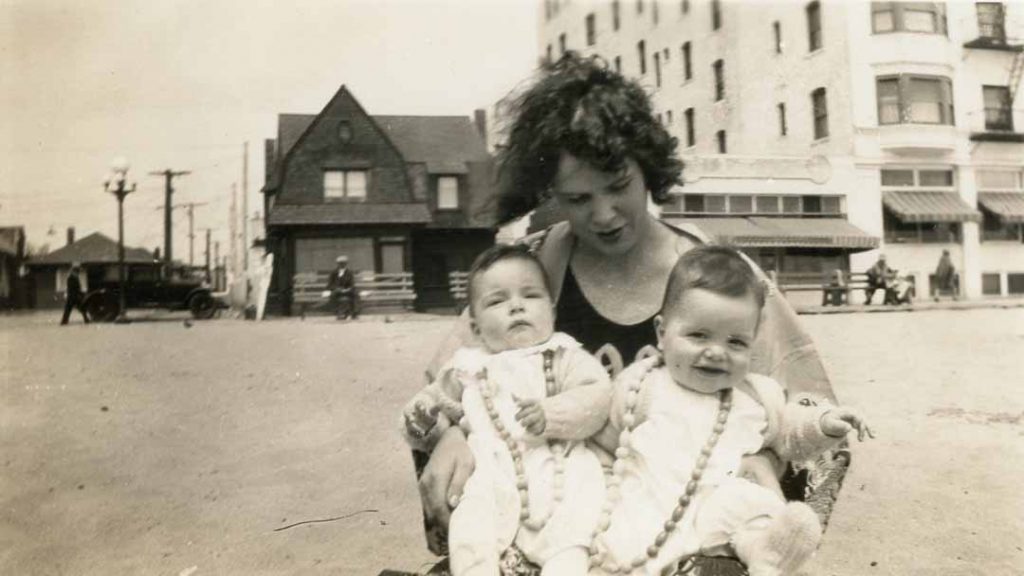
His father’s family hailed from Ireland and England. Carl’s mother was a direct descendant to Jefferson Davis, president of the Confederacy. She was a dedicated wife and mother and her priorities were summed up in one word, “family.” She loved to cook. Her own family came to this country from France and Switzerland.
“I had a happy childhood with my twin sister Betsy. We were best friends,” Carl remembered on the eve of his 90th birthday. “We lived in a very nice area. I was near my grammar school and had friends all around me. Everyone owned their own homes in those days, mothers were always at home. Ours was always busy. I remember in the 1950s we had television in our home. In those days you had to get up off the couch and manually turn the channel on the TV. We had a 20-inch, black & white TV and three channels from which to choose. My sister and I went to Saturday matinee every week to see B movies, news reels and serials such as ‘Radio Patrol’ and ‘Flash Gordon.’”
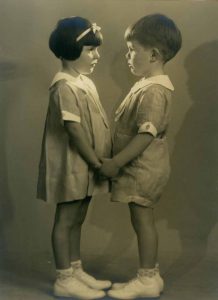
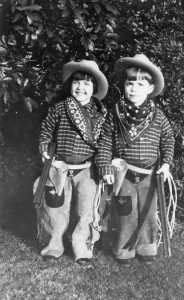
Carl played baseball and football in the street in front of his house. He made a lot of childhood memories with his father. “My dad taught me how to fish and how to hunt. In the 1930s, my father and I fished off an old ship that served as a fishing barge by day and a gambling casino at night – in Santa Monica Bay. You went to the barge by shore boat or water taxi and boarded an old gangway. There were large bait tanks on the main deck, filled with anchovies. You brought your own poles and reels, and you always caught fish – mackerel, barracuda, perch, sharks and halibut.”
Carl and his father enjoyed a special bond, a relationship Carl would later enjoy with his son Tim as well. “My father taught me to be honest, to work hard and stay out of trouble. We were very close,” said Carl. “Those are the gifts I give to my own son, Tim.”
Sadly, Carl lost his father in 1947 from a heart attack, at the age of 45. Carl was only 17 at the time. “My mother came in my room and said my father was very ill. I ran to his bedside and held him as he aspirated his last breath. He died in my arms. That’s something you never forget.”
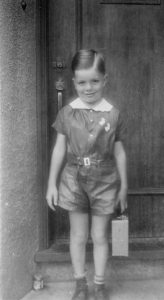
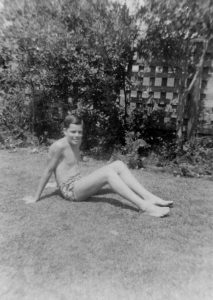
Carl attended Los Angeles High School, graduating there in 1946. He joined the ROTC while still in high school. He then attended the University of Southern California (USC) majoring in pre-dental. While at USC he joined the National Guard (1947) and attended Officers Candidate School in San Antonio, Texas.
Soon after, the Korean War broke out. Carl remembered where he was when he heard the news. “I was driving down Wilshire Boulevard in my white, 1946 Mercury Club Coupe when I heard on the radio that North Korea had attacked South Korea and the California National Guard had been called into active duty.”
In 1950, he reported to Fort Sam Houston Army Medical School in San Antonio. In 1951, Second Lieutenant Carl Jennings was about to receive his first overseas assignment, occupational duty in Japan.
In December of 1951, Carl was sent to North Korea, in the Army Medical Services Corps. He was a battalion surgeon’s assistant, and later a medical platoon leader, where he served as first lieutenant with 24 medics under him and a doctor above him, working in the combat zone.
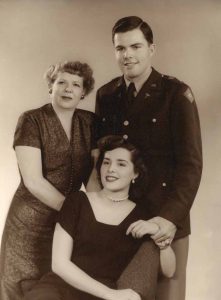
Carl’s time in Korea was filled with narrow escapes. His medical team was bivouacked right on the front line. More than once they had to retreat on short notice with their patients to avoid being overrun by Chinese soldiers, at times, amidst ricocheting bullets, and panicked soldiers also running for safety.
Once, an artillery spotter called and issued an emergency evacuation. Carl’s medical tent was about to be attacked and its occupants either captured or killed. A sudden snow storm created a white out that halted the Chinese attack, saving Carl, his corpsmen and his patients.
Afterwards, Carl joined a band of GIs exploring the deserted Chinese base camp just over the ridge. “The snow was starting to thaw, and I could see Bouncing Bettys all over the ground – landmines that looked like toadstools. If you stepped on them, they would launch about three feet into the air and then explode. That explosion scattered a lethal spray of shrapnel in all directions.”
“I could hear the shrapnel zinging through the air around us and exploding at our feet.”
Another time Carl found two dead Chinese soldiers, frozen with their eyes open. As he rummaged through their personal effects in an effort to identify them, he spotted thin trip wires connected to live mortar shells at the entrance to the bunker.
It was not uncommon to find the jeep or truck he was in, being shelled by enemy artillery – exploding on all sides of the vehicle, just 100 feet or so from the intended target. Sometimes phosphorous shells exploded on the ground and in the air all around them, wreaking havoc and creating fear and confusion in the ranks.
“Phosphorous acid is terrible stuff,” said Carl. “If it hits the ground near you, you are hit with a splash of deadly chemicals that go right to the bone. I could hear the shrapnel zinging through the air around us and exploding at our feet.” That day a phosphorous shell exploded right in front of him. Fortunately, it was defective, and, instead of splashing, it Roman-candled, allowing Carl and his driver to retreat out of range. “I said out loud, ‘Thank you Jesus,’ and we got the heck out of there.”
“I had seen enough bloodshed and had enough close escapes from death. It was time to go home.”
As a man of God Carl was always quick to explain his good fortune. “The Lord had other things planned for me. I was afraid in Korea, we all were. But I took great comfort in knowing I had that relationship with God.”
He came to know the Lord as a young child. His mother was Episcopalian and his father a Christian Scientist. Between those two churches, the children spent a lot of time in Sunday School. “I just grew up believing Jesus was my Lord and Savior.”
Carl was only in Korea from January-June 1952, but it seemed like a lifetime to him. Among his many medals and awards were a Bronze Star (Korea), Combat Medical Badge (Korea), United Nations Ribbon, Combat Ribbon (with two stars), a Japanese Occupation Ribbon, and numerous other decorations for action under hostile fire in Korea.
Towards the end of his tour, Carl was offered a captaincy if he would stay in Korea. He declined that offer because, in his words, “I had seen enough bloodshed and had enough close escapes from death. It was time to go home. Sometimes you get that feeling that your time is up. I felt that way.”
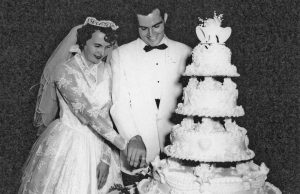
Carl returned to USC just seven units shy of his degree. But his experience in Korea caused him to reevaluate his life. He decided to go into the ministry. In 1954 he graduated from USC with a Bachelor’s Degree in English and history. He married his childhood sweetheart, Evelyn Nelson that next year. The Korean War was finally behind him.
Carl met his bride to be when his twin sister brought Evelyn to their house one night, with a group of girls. “She had blonde hair, was about 5’6” and was 100% Swedish,” he recalled of that first meeting, “and, my mother liked her.”
“My voice was so bad that at one point my liturgist asked me to step back from the microphone when singing.”
“Evelyn was kind, bright and very thoughtful. Unlike me, she had a beautiful singing voice. My voice was so bad that at one point my liturgist asked me to step back from the microphone when singing. The Lord gave me lots of gifts. Singing was not one of them. I’m completely tone deaf.”
“Just by chance, Evelyn lived on the way between my home and USC. So, my sister and I would pick her up every day in my 1931 Chevrolet, 4-door sedan. She loved that car. It had red wheels with wire covers, and was painted Robin Egg Blue. And that’s how our relationship began. I got to know her parents and sister quite well. One night I proposed in her living room and she said yes. We were married in 1955 at St. John’s Episcopal Church in LA, with lots of family and friends in attendance.”
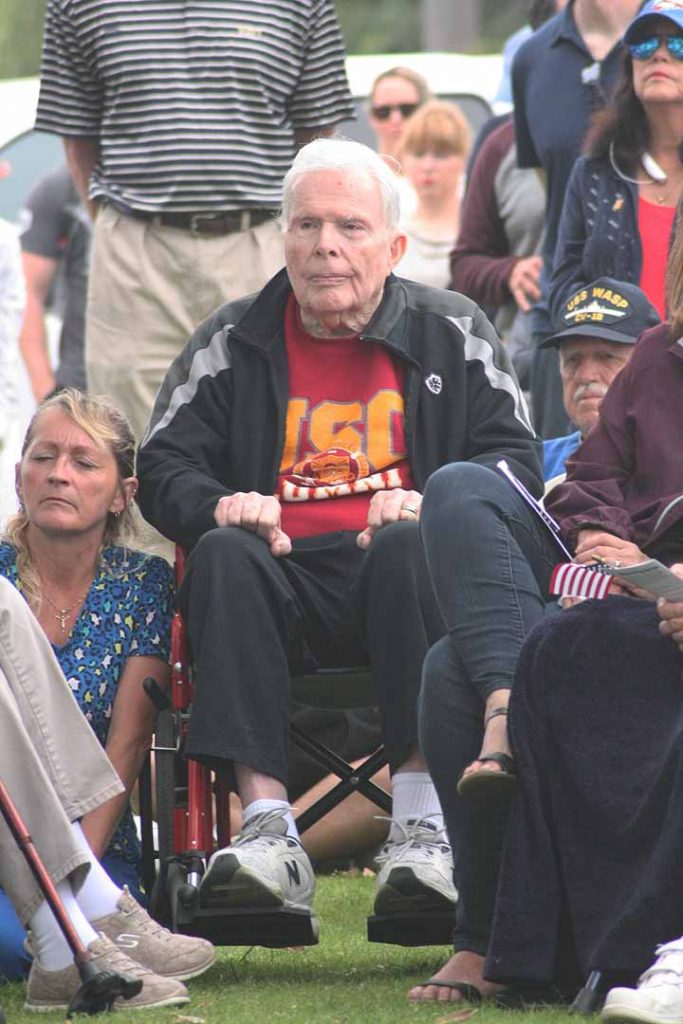
The newlyweds moved to Berkeley, where Carl entered the Episcopal Seminary for one year. He then attended the American Baptist Seminary in Covina for two years, receiving his Bachelors in Divinity Degree. “Evelyn worked as a school teacher at that time and I was on the GI Bill,” said Carl, “so we were not financially encumbered, thank goodness.”
Carl’s first assignment was First Baptist Church in Pearl Harbor. He was there from 1960-1963. After that he went to the First Baptist Church, in Banning, California. He served there for seven years before being reassigned to Lindley Baptist Church, in Encino, California. After that he was at the Coronado Baptist Church, in the 400 block of C Avenue, where he presided for ten years.
During his time as a minister, Carl performed hundreds and hundreds of weddings, funerals and baptisms. “Too many to count,” he would say. Working in Coronado presented an ideal situation for the Jennings family, and allowed Carl to raise his family in Coronado, just a short walk from his church.
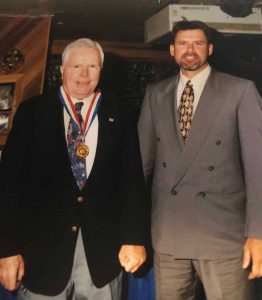
Carl and Evelyn were parents of two children — Jennifer Anne and Tim. Jennifer died in 1977 of Systemic Lupus, and Evelyn passed in 1987 of breast cancer. On one hand, Carl had to deal with the tragedy of war, and personal loss at an unusually high level. And yet, he spent many years, decades in fact, helping others and introducing them to the Lord.
He often felt he didn’t have a handbook to follow when raising his own children – a set of fatherly commandments from which to work. And yet, he was adamant that everything he did with and for his children included the following: “God being father, my being there for them in thick and thin, setting a good example, keeping my word, spending time with my children and encouraging them in school and in life. Most importantly, telling them I loved them, again and again and again.”
Carl retired as a full colonel Army chaplain in 1995. After leaving the ministry he worked as an insurance agent with Prudential for ten years.
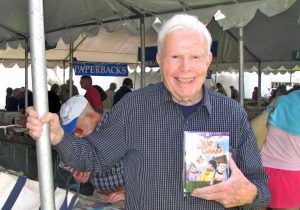
After Evelyn’s passing, Carl and Tim weren’t sure how to move forward. Tim married, had three children and moved to Wyoming. In 1988, Carl met Marie Armstrong, who also was recently widowed. They married that year and remained together for the remainder of their lives – for more than 30 years.
“Our meeting was providential,” said Carl. “The Lord provides. He didn’t intend for me to live out my last years alone.”
Carl celebrated his 90th birthday at Coronado Retirement Village, but was able to return to his Loma Avenue home shortly thereafter, which was his wish – to die at home, where he lived happily for more than a year. He was a very happy man, and shared that happiness with everyone he encountered.
Hardships helped define and shape him over the years, but Carl will be remembered as a good father, a good friend; a good Army officer and chaplain; and a good child of God. “I’ve always considered myself rich in family and friends,” he would often say, “my life has been blessed.”
Carl Jennings is survived by his wife Marie, son Tim (Peyton) and grandchildren Brock, Blair and Brynn of Afton, Wyoming. Also surviving him is niece Susan Montalbano of Temecula. He was predeceased by his sister Betsy, first wife Evelyn and daughter Jennifer.
Services to be announced. In lieu of flowers, the family asks that donations be made to the Veterans of Foreign Wars (Post 2422, located at 557 Orange Ave, Coronado, CA 92118), “In Memory of Colonel Carl Jennings.”
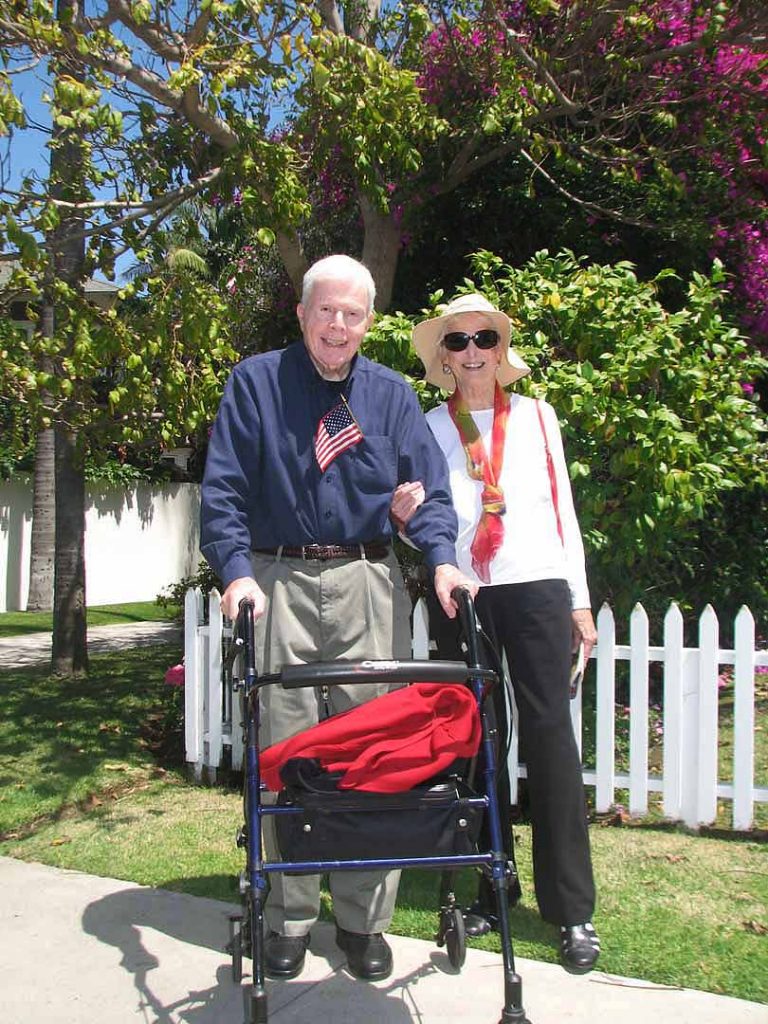
Joe Ditler, who interviewed Carl Jennings and wrote this tribute, owns and operates “Coronado Storyteller.” Ditler is a published writer and author, publicist and historian. He offers his services in writing these “living obituaries” so as to capture stories like Carl Jennings’ — both for history and posterity — while they can still tell their story in their own words, and to relieve that burden from surviving family members at the time of death. Ditler has captured the stories of dozens and dozens of Coronado’s respected members of The Greatest Generation.
For more information, contact him directly at: [email protected]




